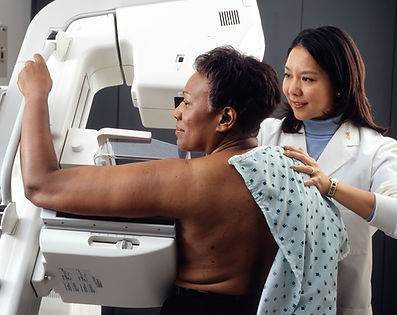
Early Screening = Better Chances
We’re working with multiple partners to get people the tests they don’t yet know they need
Throughout the pandemic, many health services had to pause parts of their work or adapt the way they work entirely. Cancer screening is one such activity that was delayed for many months. That, along with many primary care practices moving to virtual care, caused a backlog in early detection screening of breast, cervical, and colorectal cancers.
But cancer is always a concern. So, a renewed focus on detection is in place.
Regular cancer screening is key for people who are eligible, even if they have no symptoms and are generally feeling fine.
That way, cancers can be found early, and treatments are more effective.
Breast Cancer Screening Eligibility:
Average Risk
The Ontario Breast Screening Program recommends that most eligible women, trans and nonbinary people ages 50 to 74 get screened with mammography every 2 years.
People ages 50 to 74 are eligible for screening through the
Ontario Breast Screening Program if they:
• Have no new breast cancer symptoms
• Have no personal history of breast cancer
• Have no current breast implants
• Have not had a mastectomy
• Have not had a screening mammogram within the last 11 months
High Risk
People ages 30 to 69 are eligible for screening through the
Ontario Breast Screening Program if they:
• Are known to have a gene mutation that increases their risk for breast cancer
• Are first-degree relatives (parent, brother, sister or child) of someone who has a gene mutation that increases their risk for breast cancer
• Have been assessed by a genetics clinic as having a 25% or greater lifetime risk of breast cancer based on personal family history
• Have had radiation therapy to the chest to treat another cancer or condition before age 30 and at least 8 years ago


Cervical Cancer Screening Eligibility:
The Ontario Cervical Screening Program recommends that anyone with a cervix who is or ever has been sexually active have a Pap test every 3 years starting at age 25. If you are under 25, talk to your health care provider about whether you should wait until age 25 before starting cervical screening with the Pap test.
The Canadian Cancer Society says some women have a higher than average risk of developing cervical cancer. You may be at higher risk if you have:
• A weakened immune system
• Been exposed to diethylstilbestrol (DES) before birth
• Constant infection with high-risk types of human papillomavirus (HPV)
• Genital warts that are long-standing or difficult to treat
• Cancers related to HPV such as cancer of the anus or vulva
Colon Cancer Screening Eligibility:
The Ontario Government says people can be checked for colon cancer if they are:
Average Risk
• defined as people ages 50 to 74 with no immediate relatives (for example, parent, brother, sister or child) who have or have had colon cancer
Increased Risk
• defined as people with a family history of colon cancer that includes one or more immediate relatives (for example, parent, brother, sister or child)

Speak to a health care provider to see if you are eligible for these and other tests.
The Ottawa Health Team - Équipe Santé Ottawa is working with many partners to design community outreach and screening initiatives to support more newcomers and racialized community members to access cancer screening.
Evidence shows that newcomers and racialized populations are screened for cancers at a lower rate than the general population and are also less likely to have regular access to primary care.
A resource toolkit to support health and social service providers connect with their clients about the importance of preventative cancer screening is anticipated in mid-January and will include resources in multiple languages.
Other supports, including simple pathways on where clients with or without a primary care practitioner can be screened, and new videos demystifying the screening process, are in the works.
Stay tuned to our Facebook page for more details to come!